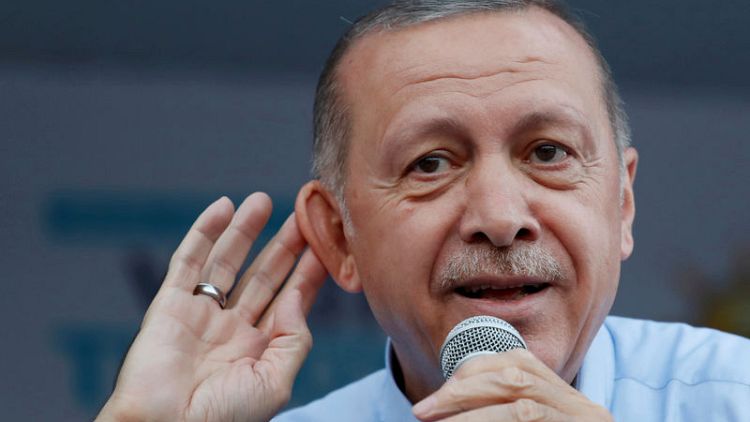By Can Sezer
ISTANBUL (Reuters) - Turkish aerospace manufacturer Kale Group said on Monday if disagreements between Ankara and Washington curb parts orders and exclude it from an F-35 project, then any lost sales would be offset by turning to civil aviation.
Turkish President Tayyip Erdogan has not backed down from the planned purchase of a Russian S-400 missile defence system that the United States has said would compromise the security of stealth F-35 fighter jets, which Turkey also plans to buy.
NATO ally Turkey has said it will take delivery of the S-400s in July, even while sources told Reuters earlier this month that Washington had halted delivery of F-35-related equipment to the country, marking the first concrete U.S. step to block its delivery.
"There has been no impact on our business so far," Kale vice president Osman Okyay told reporters on Monday. "These are large, complex parts and manufacturing continues uninterrupted. We have a five-year backlog of orders."
Kale Group and its subsidiary manufacture the cockpit and front fuselage parts for the F-35. Kale Pratt & Whitney, a partnership with the Pratt & Whitney division of U.S.-based United Technologies, produces engine parts for the plane.
"Our utmost desire is that Turkey continues to be a part of this project. However we have a plan B if Turkey leaves the project," Okyay said. "If this were to happen, we'll aim to offset its impact (on the company) by producing more civil and commercial aviation parts."
Kale produces parts for both Boeing and Airbus, however Okyay did not elaborate on these businesses specifically.
Washington says the S-400s are incompatible with NATO's defence network and would pose a threat since S-400s' radar may learn how to spot and track the F-35 and make it less able to evade Russian weapons in the future.
In March, Reuters reported that Washington was exploring whether it could remove Turkey from F-35 production.
Disagreement over the F-35 is one of a series of diplomatic disputes between the North Atlantic Treaty Organisation members. There are also differences over Turkish demands that the United States extradite Islamic cleric Fethullah Gulen, Middle East policy, the war in Syria, and sanctions on Iran.
In 2017, Kale said it would set up a joint venture with Britain's Rolls-Royce to develop aircraft engines after a UK-Turkish defence deal worth more than 100 million pounds was signed to develop Turkish fighter jets.
But last month Rolls-Royce said it had scaled back efforts to join the Turkish programme and Kale subsequently said it was waiting for Turkey's defence industry directorate to respond to its final offer for the programme.
"As far as I know, they are looking positively at our offer, but so far they haven't made a decision," Okyay said of the directorate.
He said authorities were considering three alternatives for the engine supply of TF-X, a fighter jet in early design stage. An off-the-shelf engine from General Electric or Eurojet was viewed as an interim option, with the Kale engine seen as an intermediate alternative, Okyay added.
(Writing by Daren Butler; Editing by Jonathan Spicer and Andrew Cawthorne)
